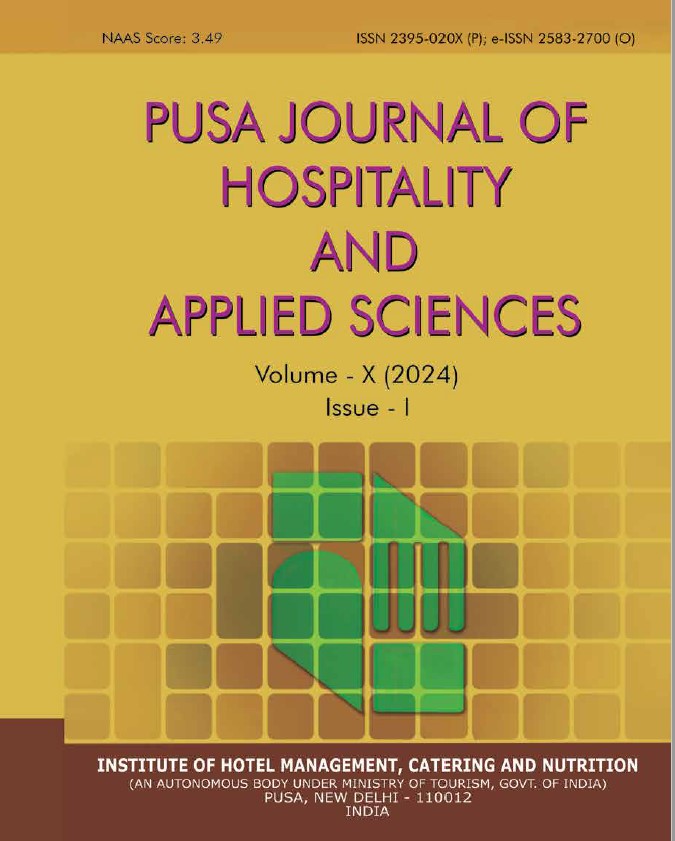An Exploratory Study On Scope Of Heuristic Methodology For Teaching In Hospitality Institutes During Pandemic
DOI:
https://doi.org/10.48165/pjhas.2022.8.1.2Keywords:
Heuristic Methodology, Learning, Explore, Discover, FacilitatorsAbstract
Background: Learning is the on-going and continuous process through our lives , there are some learning which is done through exploring new ventures, thinking differently to solve a particular problem, some learnings are through experiments and demonstrations which cannot be taught in white and black, this is where the heuristics learning evolve and came into existence and it also help the teachers or educators to break the monotony of traditional teaching methods and let the student to swim in the ocean of knowledge and get to the shore with the best possible results to the problems. Objectives: This study is to find out the acceptability and enlist prominent attitude for the heuristic learning along with the major challenges faced by the faculty in implementation of same in hospitality education. Methodology: A descriptive cross –sectional design was adopted. The study was conducted in hospitality institutes pan India through online Google Forms in form of questionnaire. Respondents were the faculty members of the institutes which were approached by sending e-mails and through online survey. Total 210 respondents participated in survey. The analysis was done by using relative importance of index along with averages and percentages. Results: The most important attitude required by faculty for the implementation of heuristic methodology are the acceptance of unique solution of students (0.867) and after testing the solution correct knowledge should be imparted to the students (0.856) (relative index of importance). The acceptability of heuristic methodology among the faculty is on average level with response of (39%) use of heuristic methodology for giving inputs to students. Various challenges in implementation are the syllabus needs a major change. The initial set of skills and knowledge are required by the students (56%), completing the syllabus will be a challenge as all the topics in various subjects are not teachable with heuristic methodology (38%). Conclusion: Respondents have given their responses towards mild acceptability towards using heuristic methodology, on the other hand the issues of challenges faced and various attitude required are strongly reflected towards the heuristic education. The need of proper training and right king of changes in syllabus are must of the successful implementation of this methodology.
References
Anonymous. (2013). Lecturer training Plan.pdf. Retrieved from cds.coe.hawaii.edu: www.cds.coe. hawaii.edu
Blomberg, G. (2013 ). Five Research- based heuristics for using video in pre-service teacher education . Journal for Educational research online, 90-114.
Bogaard, M. V. (2015). A heuristic to understand curriculum change: towards comparing 3 course programme overhauls within the Dutch 3TU coalition, 1-9.
Cardelle-Elawar, M. (1992). Effects of teaching metacognitive skills to students with low mathematics ability. Teaching and teacher education, 109-121.
Clarke, M. (1990). Heuristic research: Design, methodology, and applications. Retrieved November 3, 2021, from American Psychological Association: https://psycnet.apa.org/record/1990-98228-000
Kamid, J. M. (April 2021). The Effect of The LAPS-Heuristic Learning Model on Students’. Journal of Educational Science and Technology, 09-17.
Koriat, A. (2009, March). The memorizing effort heuristic in judgments of learning: A developmental perspective. Journal of experimental child psychology, 265-279.
Muller, C. (2016). Hospitality Management : Learninbg, Doing, Knowing. Retrieved from www. bu.edu/bhr
Satchakett, N. & Art, S. (2014). Development of hueristic problem solving and learning achivement of grade 9 students by using learning management focusing on hueristic approch in Thailand. Social and Behaviourial Sciences, 116, 1011-1015.
Schoar, A. (2014, January). The Power of Hueristic. Ideas 42, pp. 2-7.
Schuler, S. (2016, March). Systems thinking within the scope of education for sustainable development (ESD) – a heuristic competence model as a basis for (science) teacher education. Journal of geography in higher education, 192-204.




